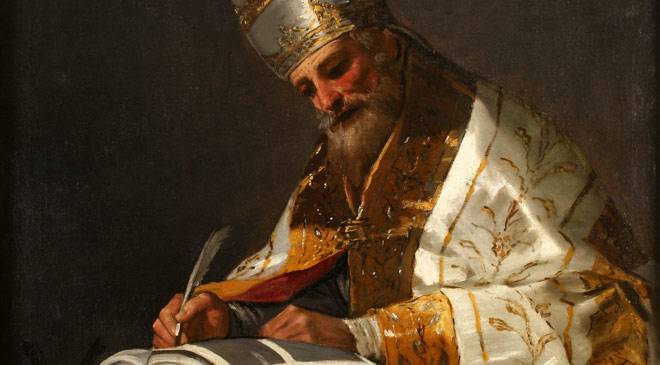The 30 Gregorian Holy Masses: a devotion loved by the dead
THE 30 GREGORIAN HOLY MASSES FOR THE DEAD
Origin (The author of this devotion is St. Gregory the Great, Pope ...) The most important and certainly full of very positive consequences narrated in the fourth book of the Dialogues, is that of the deceased monk Giusto who died in the monastery of Rome, of which he was superior Gregorio, before being elected pope, Gregorio M. who at times might have seemed hard on others as he was strict on himself, had been informed of a lack of rule of order by the monk Giusto and punished him for arouse repentance and reparation in him, very hard at his death and even after death by ordering a special burial for the poor monk.
In this regard the pope later recounts: «After 30 days from the death of the monk Giusto I felt a feeling of compassion for the poor deceased confrere; I thought with great pain of his pains in Purgatory and thought of a way of freeing him from them, so I called him Precious, the prior of our monastery, and full of pain I said to him: «it has been a long time since the deceased confrere has been tormented in Purgatory; we should offer him a work of charity, as far as we can to free him from his pains. Therefore go, and offer him the holy sacrifice of the mass for 30 consecutive days, so that there is never a day when the s is not celebrated for him. Mass. " Precious he did as he was commanded. Now while we were thinking about other things and we hadn't counted the days, once a night the monk Giusto appeared in vision to his carnal brother Copious. When he saw him he asked him: «What is it brother, how are you? (as it goes with you) "He replied:" So far it has gone very badly, but now, I'm fine; because today I was received into the Communion of Saints in Heaven. Immediately brother Copioso reported the matter to his confreres in the monastery. Then they carefully counted the days and here it was precisely the thirtieth day on which the s was celebrated. put for him. While Copious knew nothing of the thing and the confreres did not know of Copious's vision, these knew what the confreres had done and what he had seen the confreres knew.
The vision and the sacrifice agreed, it was therefore evident that the late monk Giusto had been freed from the penalties of Purgatory through the celebrations of the s. Sacrifice.
The pious use of the so-called "Gregorian Masses" therefore dates back to this account of St. Gregory M.: thirty ss are celebrated for thirty consecutive days. put for a deceased in confident hope, that the deceased in this way can obtain blessed glory in Paradise. Later in the same chapter s. Gregory also tells of a deceased who had appeared to a priest and asked him to help him: «The priest did penance for a week with great tears in favor of the deceased and celebrated the s. Sacrifice and then no longer found him in the place where he had seen him for several days before. It is therefore clear how much the offering of the holy sacrifice of the mass is beneficial to the poor souls, since the souls of the dead ask the living and make it clear that through it it is. sacrifice they could have released from their pains.
In ch. 39 of the book of Dialogues, where St. Gregory proves with scriptural arguments the existence of a Purgatory after death, he still makes this memorable observation: «This must be known that, there in Purgatory no one can even obtain the remission of the smallest sins venial, if here on earth he did not first deserve it with good works! Nobody receives if he has not given before! "
